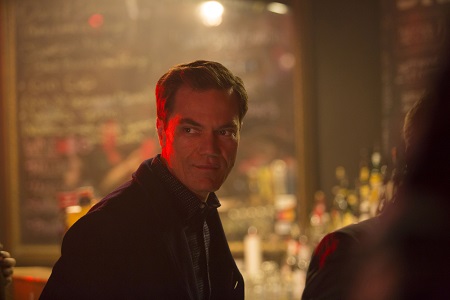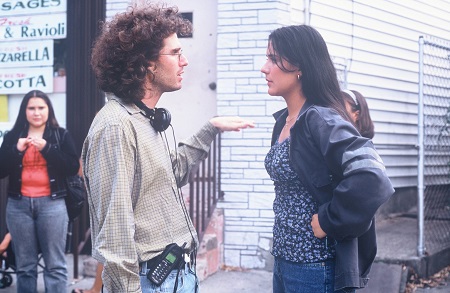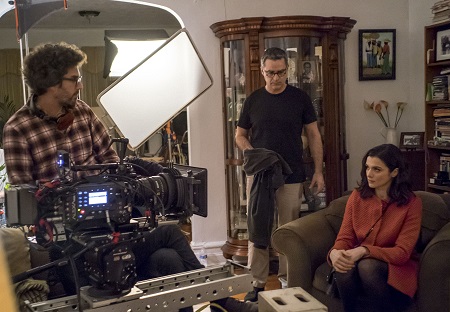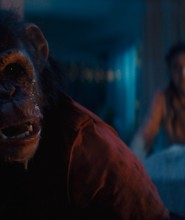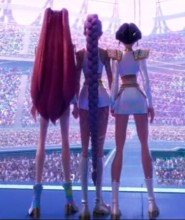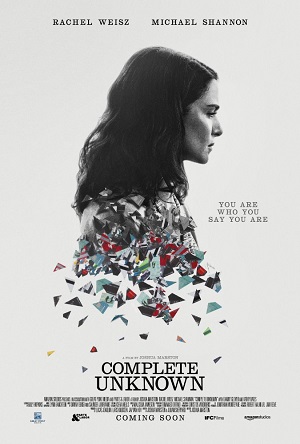
“Complete Unknown” – Interview with Joshua Marston
by Sara Michelle Fetters - September 8th, 2016 - Interviews
Secrets and Lies
Joshua Marston Constructs Human Mysteries of the Psyche with Complete Unknown
Writer/director Joshua Marston burst onto the scene in 2004 with the drug mule melodrama Maria Full of Grace, newcomer Catalina Sandino Moreno earning an Academy Award nomination for Best Actress for her emotionally bludgeoning portrayal of a young woman stranded in the most wretched of circumstances. He followed that film up in 2011 with the Albanian drama The Forgiveness of Blood, centering things on two talented youngsters, their respective characters forced to deal with the repercussions of a family blood feud tragically spiraling out of control.
With Complete Unknown, Marston changes directions once again, delivering a drama about a thirty-something woman named Alice (Rachel Weisz) who attends the birthday party of family man Tom (Michael Shannon) as the guest of one of his most trusted co-workers, Clyde (Michael Chernus). What follows is an emotionally dense, dialogue-driven tale where fact and fiction constantly wage war one against the other, Alice and Tom sharing a connection that goes way beyond this supposedly chance meeting.
I had the pleasure to sit down for a few brief moments with the talented filmmaker. Here’s some of what he had to say:
Sara Michelle Fetters: Before we really dig into Complete Unknown, I’ve got to ask, you’ve made three movies, Maria Full of Grace, The Forgiveness of Blood and now this one, over the course of a dozen or so years. Why is that? Your films are just too good for us to have you working so infrequently.
Joshua Marston: I know, right? [laughs] Too bad you’re not the head of a movie studio.
Putting it simply? Filmmaking is a bitch. That’s all I can really say. I do have my next film ready; we’re scheduled to start shooting in January. So, I guess if I can keep halving the time it takes between each project, maybe we’ll finally get to a place where I’m making a movie every year or two. Wouldn’t that be nice?
Sara Michelle Fetters: In regards to Complete Unknown, where did the idea for this story come from?
Joshua Marston: I had another movie fall apart; it was sort of the straw that broke the camel’s back. I was like, screw this, I can’t keep having this happen, and I knew I needed to write something that was small enough that once I got the building blocks in place it was a certainty I’d be able to make it. I then ran into Julian [Sheppard], and we’d been talking about making something together for some time, and we both were fascinated by the basic idea of a main character who was not who she appeared to be. That she was nothing but a bunch of false fronts and not the person she was claiming she was.
This got us thinking. What would this feel like? What sort of experiences would you have? What is the cost of living like this? And what would happen if you ran across somebody you used to know in the past? Would they recognize you? How would they react when they discover that she had, not just changed her identity, but had done it more than once? These seemed like very interesting questions to us, and we set out to compose a script where these transitions wouldn’t all happen at once, but over the course of the entire story.
Originally, the idea was to take this concept and make it self-contained, that it would all take place in one location over the course of a handful of hours. But, once we started working more with the premise, we discovered it was juicy enough that I didn’t need to contain myself to one location. The movie was able to move around.
Sara Michelle Fetters: It is interesting that, while you do get out of the one room of the birthday party, that while you do open things up, at the same time the scenario is still so character and dialogue driven that it would be easy to imagine this script translated to the theatrical stage. That isn’t meant to come across as criticism, mind you, just an observation, and one I’m sure you and Julian were cognizant of.
Joshua Marston: We were aware of that, certainly. And, to a certain extent, it was intentional. But that’s also why we worked so hard to push the story out of the nest, if you will. I think Julian and I just enjoyed imagining what would happen between Alice and Tom. One of the main ideas that we started with, once you’ve revealed what’s going on with this character, what happens next? She’s kind of like a bomb that has gone off in Tom’s life. She polarizes people. Understanding how that played out, I think that’s one of the things that kept us intrigued while we were writing the script. It was always a mystery where things were going to end up.
Sara Michelle Fetters: Speaking on that, I find it interesting that you provide AN answer to the central mystery fairly early one, maybe 30 minutes into the movie, but that doesn’t mean it is THE answer; you have to stay through all the way until the end for that. Did you worry, though, that people would potentially check out? That they would think you were solving your central mystery a little too fast?
Joshua Marston: We were worried that not all viewers would be as smart as you. [laughs]
In all seriousness, yes, you are likely my ideal viewer. Your reaction is exactly what I think it was we were hoping for. At the same time, is that a concern? Is it a concern that viewers would not go with the movie? Yes. Certainly. I wanted people to go with the movie. To understand that, just because one question has an answer, that doesn’t mean all of the ones being posed are going to be given solutions immediately as well. What that means, I think, is that you have to let go of your own expectations of what [the story] should be or where it should go.
That can be a tough thing for an audience to do. It’s also something I’m actively trying to guide them towards being able to do. But, the reality is some people will be able to go on this ride and some people will not. It’s just the nature of storytelling. [Complete Unknown] changes gears very significantly and more than once, which isn’t something movies typically do. When someone settles in for the evening, when they decide what they are going to watch, they don’t always want it to suddenly become something else, something unexpected.
But, in the way that Rachel Weisz’s character polarizes the room, I wonder if there isn’t something of a parallel with people watching the movie itself. Some people will be able to ride with a movie that keeps changing. Others, not so much, they’re going to want it to be one thing. But the movie isn’t that. More, I never wanted it to be.
Sara Michelle Fetters: But isn’t that the thing with you as a filmmaker? You look at Maria Full of Grace, you look at The Forgiveness of Blood, on the surface both seem like pretty simple, straightforward stories. But as they progress, each becomes anything but, changing gears multiple times before proceeding to their respective conclusions.
Joshua Marston: That’s true. You know, there is a desire, and sometimes it is useful and sometimes it’s frustratingly challenging, to tell stories that have not come out before but to masquerade them as ones the audience might be familiar with. With Forgiveness of Blood, in a blood feud story the central question typically is whether or not someone is going to pick up a gun, that you’re following a main character who you’re waiting to see pick up a gun and then commit revenge. But that’s not what I wanted to do. I’m telling a story, that’s actually a side story, in a way, that’s actually about collateral damage.
With, Maria Full of Grace, that’s the kind of story that would normally focus on the drug kingpin. But I don’t care about that. I wanted to tell the story from the other side, from the perspective of the mule. That just felt like a more interesting story to me.
With Complete Unknown, we didn’t sit down with the premise all worked out. We started with something, an idea, and then it evolved from there, and there came a point where I realized what we were conceiving as Alice’s character, there was just so much more we could do, so much other story to take advantage of. That allowed us to go in unforeseen directions that, I think, got us all really excited.
But, what I kept coming back to, what is most interesting to me is that fundamental emotional story, and with her, it wasn’t just about the benefits of living this life, but what the costs were, psychologically and emotionally, and how that was going to be juxtaposed with the life Tom, Michael Shannon’s character, was currently living. That fascinated me. While you can imagine so many different stories for her, for Alice, this night, this story, is the most important one of her life in terms of what is genuinely at stake. That ends up being the story I’m interested in.
Sara Michelle Fetters: With Maria Full of Grace and The Forgiveness of Blood, you worked primarily with unknowns, even leading Catalina Sandino Moreno to an Oscar nomination for the former. Here, you’ve got bona fide movie stars working with you as far as Weisz and Shannon are concerned. What was that like?
Joshua Marston: It’s exciting, working with actors who are so talented, so skilled. With those other two movies, there was a little bit of a period where you had to establish a rapport, where you had to teach them about movie acting, in a way. And, while that might be overstating things a little bit, because they were all so new there was a learning curve.
Here, it was like playing in a sandbox. These actors are so incredible, so versatile, and they’re ready to go right from the first day. At the same time, there’s also all sorts of new challenges when you’re working with movie stars. They have expectations and rules about what they will and won’t do and about how they will or won’t work, and you have to learn how to navigate that as this can be really constraining at times.
Sara Michelle Fetters: Still, especially as it pertained to the inherent nature of the character you had created, it had to be nice to be able to rely on someone as talented as Weisz to bring Alice and all her various emotional components to life. This character so easily could have become nothing short of a melodramatic cartoon, and in lesser hands likely would have.
Joshua Marston: She is incredible. There is something about Rachel’s qualities on-screen that are absolutely devastating. And, you’re right, she grounds this character, finds her innate humanity, and those are exactly the conversations she and I had before shooting. We had long conversations about why this character does what she does. She asked if it was a fantasy and I was like, no, this is real, we’re treating this realistically.
I didn’t want to say it was a fantasy, because what I actually felt like Rachel was asking me was what was the tone of the movie going to be and thus what the tone of the performance she was going to go for was going to be like. The truth is, yeah, to a certain extent, it is a movie, it is a fantasy, and it’s not like I’ve ever met someone who has done this. There is a certain amount of fantasy involved in thinking this up. But I didn’t want to treat the character or the story like that. I wanted to treat it all as reality. And Rachel, once she understood that, never wavered once. Her performance walks a really fine line. She’s extraordinary.
Sara Michelle Fetters: Then there is Michael Shannon. What can you say about him that hasn’t probably been said before? I mean, what an astonishing talent. It’s like he can take any character, any at all, and instantly make them someone you just can’t take your eyes off of.
Joshua Marston: That’s a quality he has as a human being. What I experienced, that was impressive to me, was that he is able as an actor to portray a character who is clocking multiple things all at once keeping a number of balls in the air all at the same time. He’s in a situation where, with his character, there are seven other people in the room, and Tom has a relationship with each and every one of them. Michael is able to keep track of all of that. He’s clocking what’s going on with his wife, what going on with his friends and what is going with Rachel Weisz’s character at any given moment.
It’s like he’s got eyes in the back of his head. Michael is able to keep an awareness about what is going on, what is happening, that’s amazing. That’s got be very difficult, and he has the ability to make it look very, very easy.
Sara Michelle Fetters: What do you hope to keep exploring as a filmmaker? Where do you want to go next?
Joshua Marston: Everywhere. [laughs] I’m drawn to continuing to do movies like my first few, which are small, character-driven and journalistic in fashion. But I’d also love to make a big budget sci-fi movie. I’d love to do a thriller. But, the thing that connects them all, is that I’m interested in continuing to tell stories that are complicated, and that whether emotionally or psychologically, that these movies I make will leave the viewer with something to think about after they’re over.
I’ve been lucky. The response to my films has been gratifying, but it’s also been more than a little bit nerve-wracking. You spend so much time making these films, and then when you put them out there into the world it’s always surprising to hear the reactions because you never allow yourself to presuppose how people are going to respond.
With this one, I hope that people are both talking about the characters, thinking through what they saw and what was taking place off-screen, but then, beyond that, I want them to project their own selves into who these people are and how they’ve dealt with the choices they have made. Does it remain true that, wherever you go there you are? Or is that just an excuse that we tell ourselves in order to not come up with the courage to go out there and do something different? I hope that’s the sort of question that resonates with people.
– Interview reprinted courtesy of the SGN in Seattle

